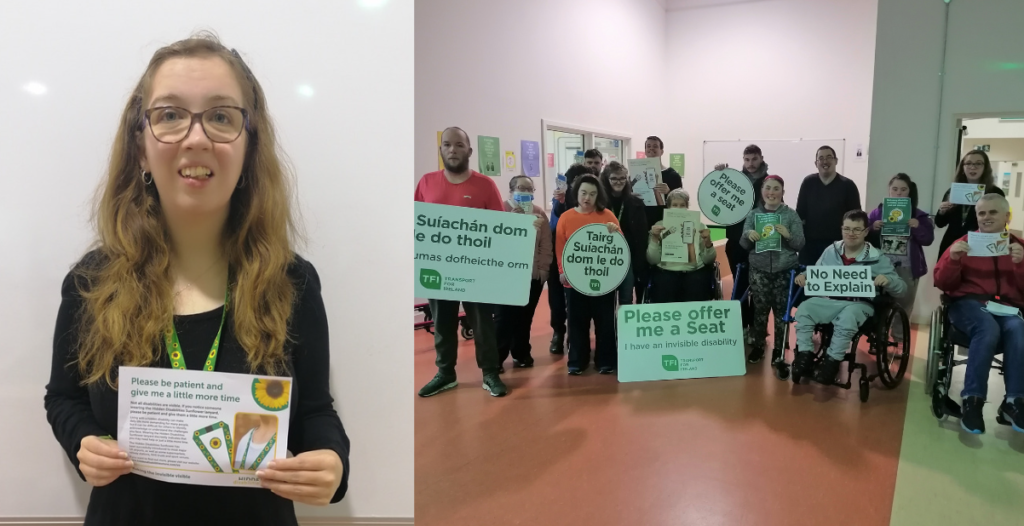People attending RehabCare Castlebar disability support service have launched an awareness campaign aimed at highlighting hidden disabilities and the innovative schemes that help people with disabilities to indicate that they may require patience and understanding when interacting in shops, on transport, in public spaces or in social situations.

Hidden disabilities, or non-visible disabilities, include those that are not immediately apparent, such as autism, learning and intellectual difficulties, and chronic illnesses or conditions that can impair people’s daily lives. They can include mental health conditions, mobility issues, speech impairments, and sensory issues.
In recent months, several members of Rehab Group’s Regional Advocacy Committee in Mayo expressed a desire to roll out an awareness campaign in their local area, bridging the gap between the daily experiences of people with disabilities and the lack of awareness of hidden disabilities in the public mind-set.
The idea behind the campaign originated with committee member Leanne Biffin and, was swiftly taken on board by the group.
Leanne said: “When I was a child, I struggled sometimes in school. I’ve been attending RehabCare Connections in Castlebar for the last 3 years and they help me learn new skills, however, I still need support with things like dealing with money and talking to staff in shops.”
Rehab Group’s Advocacy Officer Claire Gibson said: “There are schemes and supports available that can really help promote inclusion in society, if only more people know about them. Leanne brought this idea to the committee and everyone was delighted to support it. We want to spread the message far and wide, not just in Mayo but across the country.”
Rehab Group’s Regional Advocacy Committees comprise people who use RehabCare’s services and students of National Learning Network, who are elected to represent their peers. The committees regularly meet under the guidance and support of Rehab Group’s Advocacy Officers, to discuss issues of importance, both within and outside the organisation, and providing an impactful voice for themselves and others. Helping people with disabilities to overcome communications barriers that they face in their daily lives, has become a major focus for the group over the past few years.
As part of the new awareness campaign, the Committee members wished to highlight the benefits of the Sunflower Lanyards, a globally-recognised symbol for non-visible disabilities, which are offered for free by many retailers and services across Ireland, including Irish Ferries, in Tesco stores, at Knock, Cork and Dublin airports and the Citylink Coach.
Leanne added: “Sometimes when I am in a shop or a restaurant, I need people to talk a little more slowly and support me more. When I am out in a restaurant with my group from RehabCare, sometimes the waiters will only speak to our staff members and not to us because they think it’s easier. I want them to know that they should speak to us.”
Speaking about her use of the Sunflower Lanyard, Leanne said: “The lanyard is something that people with disabilities wear around their neck and can show to staff in shops. They see the lanyard and realise that they are dealing with someone with a hidden disability and can give them some support. I think it will make a big difference for people with a hidden disability. People in shops, in restaurants and on transport will be kinder and more patient. It will help them and it will help us. It benefits everyone.”
Additionally, the members wish to highlight ‘Please offer me a seat badge’ from Transport for Ireland, and also the JAM (Just. A. Minute) Cards, which can be used by people with a disability as a subtle explanation that they require patience when communicating with bus drivers, hospitality workers and shop assistants.
Speaking about the campaign, Claire added: “We really felt it was important that people who are eligible for these lanyards and cards, are able to access them and use them as they go about their daily lives. We want the general public, and people in local businesses and organisations, to recognise the meaning behind these resources and hopefully be more accommodating towards people with disabilities.”
Members of RehabCare Castlebar have plans to visit community services and businesses in their locality to spread awareness of hidden disabilities.
JAM cards be obtained from www.jamcard.org or at railway stations in Dublin, Cork, Sligo, Galway, Limerick and Waterford. They are also available from Dublin Bus Head Office and TFI Local Link Offices around the country, and can also be downloaded on a smartphone as an app. Sunflower Lanyards are available at customer service desks in Tesco stores. ‘Please offer me a seat’ badges and cards are available from TFI Local Link offices.